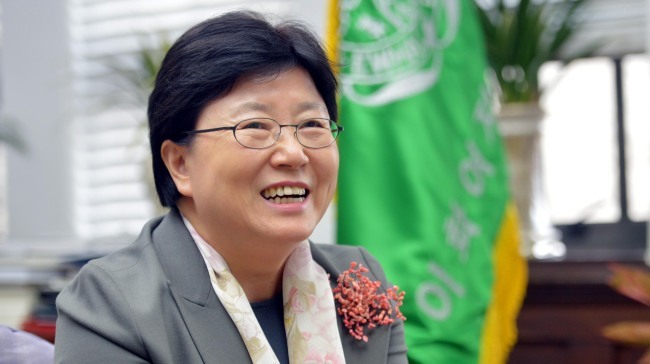Foreigners are often perplexed by the English name of Korea’s first, top and fast-globalizing university for women, Ewha Womans University.
The modified singular form is not a misspelling, but an embodiment of the proud founding spirit of the school.
Ewha was established in 1886 when women were still regarded as second-class citizens, forced to sacrifice themselves to family, but on the verge of challenging male dominance in the wave of Westernization.
In choosing “womans” instead of “women,” the founders believed that every individual woman should be respected and her values and ideas should be cherished, its president Kim Sun-uk said in an interview with The Korea Herald.
For the past 127 years, Ewha has been a key driving force of Korea’s progress in terms of gender equality and women’s empowerment through education.
It has produced generations of leaders in diverse fields, including Kim herself, who is the nation’s first female minister of the Ministry of Government Legislation.
Another possible misperception about the school which Kim wants to clarify is its size.
“Many foreign visitors assume Ewha is just a small liberal arts college for women. They are often surprised by the fact that we have now about 25,000 students, 1,000 faculty members on campus and have more than 200,000 alumnae,” Kim said in her office in the campus in Seoul.
“I don’t think there is any women’s university that offers more majors than we do.”
Consisting of 11 colleges and 15 graduate schools of 67 disciplines, Ewha is the world’s biggest women’s university in terms of numbers of courses.
Kim is pushing ambitious projects to make the school the global center of women’s education, and to enhance Korean women’s competence in science and technology, in a country where gender gaps still run deep.
“Globalization has always been our priority,” the 61-year-old president said.
Since Kim took the helm of the school in 2010, she has been working hard to extend networks with leading foreign institutions.
This year alone, Kim signed more than a dozen partnerships, increasing its global collaborative networks to 871 institutions in more than 72 countries.
Each year about 3,800 international students study at the university, and more than 1,600 students from Ewha participate in various short- and long-term overseas programs at its partner universities, according to the president.
“Through the partnerships we aim to build more research ties with leading institutions,” Kim added.
Ewha hopes to contribute a better education for women, especially in developing countries, in which women’s participation in the workforce is key to fighting poverty and promoting growth.
The school started the Ewha Global Partnership Program in 2006, offering select students full tuition and monthly living allowances to attain degrees at the Ewha campus ― about 150 women from 33 countries have benefited from the program so far, she said.
It has also provided scholarships to female government officials through the Ewha-KOICA Master’s program in international studies and has run Ewha Global Empowerment Program, a non-degree course, targeting female civic activists and NGOs from Asian and African countries.
Another priority for Kim is breaking still-high glass ceilings in science and technology.
Despite having one of the nation’s top medical schools and general hospitals, her goal to build “Science Ewha” faces tough challenges, including shortages of female researchers.
“We’re especially short of Ph.D. students in science,” she said.
Cultural stereotypes often make female students too nervous to pursue a career in science fields, she said.
“But we’re trying to change the norm, to remedy the dearth of women scientists for the development of the country,” Kim added.
Ewha is currently working to build world-class infrastructure for research on campus. Notably, the school signed an agreement in 2011 with Solvay, the international chemical company, for joint technology development.
The Belgium-based company has pledged a total investment of $21.5 million to build the Korean Research, Development and Technology Center on Ewha’s campus and to provide its students with scholarships and research funding.
The R&D center, which will focus on pioneering research, such as lithium-ion batteries and photoelectric cells, is aiming to open in January next year, according to the president.
“Solvay is a global corporation that has produced numerous world-renowned scientists including Marie Curie, the first woman to win the Nobel Prize,” Kim said.
“I anticipate that the collaboration will create a great synergetic effect. I believe we’ll produce the next Marie Curie in Korea.”
In addition, the school is currently building student dormitories, Ewha Residential College, to accommodate all first-year students from 2015. The purpose, Kim said, is to provide students with “total education.”
“By studying and living together in the residential college, students will be offered a wide range of opportunities to develop their character, creativity and leadership,” Kim said.
The president is confident of her projects, based on Ewha’s long-established experience and know-how in women’s education ― which are not comparable to any other institution in the world, she said.
The school’s graduates have been seen contributing greatly to improving the status of women and the development of the nation. Among the best known are Esther Park, the country’s first female physician; Chang Hai-won, the first female chemist; and Lee Tai-young, the first female lawyer in Korea.
“You can find role models and mentors in our university who can guide your paths, to nurture your dreams to be future women leaders.”
Profile of Kim Sun-uk
● Kim was inaugurated as president of Ewha Womans University in 2010. She has worked as a professor at the school of law since 1995.
● She worked previously as the first female minister of the Ministry of Government Legislation from 2005-2007.
● Kim also served as president of the Korean Association of Gender and Law from 2008-2009, and has been working as chairperson of the Ministry of Justice’s Policy Committee.
● Kim graduated from the university with a bachelor’s degree in law in 1975, and earned her doctoral degree in the same field at the University of Konstanz in Germany.
By Oh Kyu-wook (
596story@heraldcorp.com)








